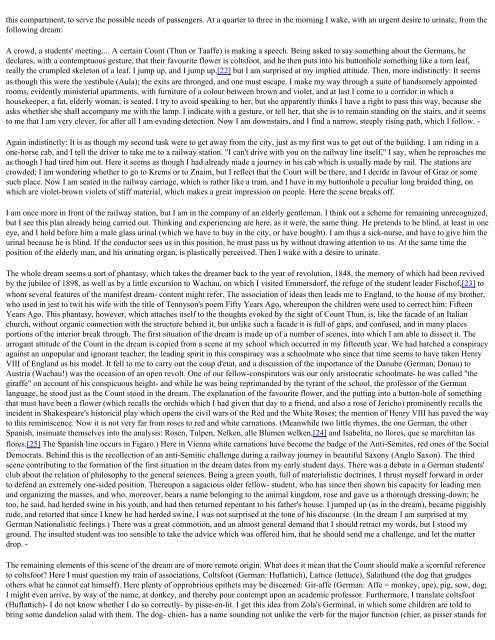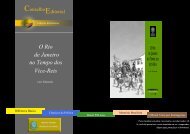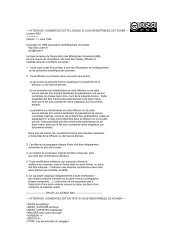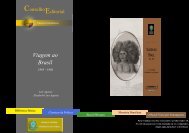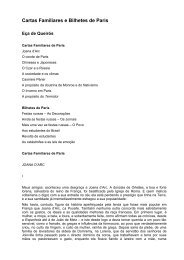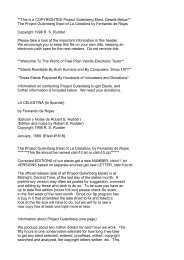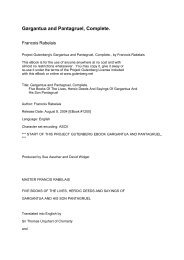The Interpretation of Dreams Sigmund Freud (1900)
The Interpretation of Dreams Sigmund Freud (1900)
The Interpretation of Dreams Sigmund Freud (1900)
You also want an ePaper? Increase the reach of your titles
YUMPU automatically turns print PDFs into web optimized ePapers that Google loves.
this compartment, to serve the possible needs <strong>of</strong> passengers. At a quarter to three in the morning I wake, with an urgent desire to urinate, from the<br />
following dream:<br />
A crowd, a students' meeting.... A certain Count (Thun or Taaffe) is making a speech. Being asked to say something about the Germans, he<br />
declares, with a contemptuous gesture, that their favourite flower is coltsfoot, and he then puts into his buttonhole something like a torn leaf,<br />
really the crumpled skeleton <strong>of</strong> a leaf. I jump up, and I jump up,[22] but I am surprised at my implied attitude. <strong>The</strong>n, more indistinctly: It seems<br />
as though this were the vestibule (Aula); the exits are thronged, and one must escape. I make my way through a suite <strong>of</strong> handsomely appointed<br />
rooms, evidently ministerial apartments, with furniture <strong>of</strong> a colour between brown and violet, and at last I come to a corridor in which a<br />
housekeeper, a fat, elderly woman, is seated. I try to avoid speaking to her, but she apparently thinks I have a right to pass this way, because she<br />
asks whether she shall accompany me with the lamp. I indicate with a gesture, or tell her, that she is to remain standing on the stairs, and it seems<br />
to me that I am very clever, for after all I am evading detection. Now I am downstairs, and I find a narrow, steeply rising path, which I follow. -<br />
Again indistinctly: It is as though my second task were to get away from the city, just as my first was to get out <strong>of</strong> the building. I am riding in a<br />
one-horse cab, and I tell the driver to take me to a railway station. "I can't drive with you on the railway line itself," I say, when he reproaches me<br />
as though I had tired him out. Here it seems as though I had already made a journey in his cab which is usually made by rail. <strong>The</strong> stations are<br />
crowded; I am wondering whether to go to Krems or to Znaim, but I reflect that the Court will be there, and I decide in favour <strong>of</strong> Graz or some<br />
such place. Now I am seated in the railway carriage, which is rather like a tram, and I have in my buttonhole a peculiar long braided thing, on<br />
which are violet-brown violets <strong>of</strong> stiff material, which makes a great impression on people. Here the scene breaks <strong>of</strong>f.<br />
I am once more in front <strong>of</strong> the railway station, but I am in the company <strong>of</strong> an elderly gentleman. I think out a scheme for remaining unrecognized,<br />
but I see this plan already being carried out. Thinking and experiencing are here, as it were, the same thing. He pretends to be blind, at least in one<br />
eye, and I hold before him a male glass urinal (which we have to buy in the city, or have bought). I am thus a sick-nurse, and have to give him the<br />
urinal because he is blind. If the conductor sees us in this position, he must pass us by without drawing attention to us. At the same time the<br />
position <strong>of</strong> the elderly man, and his urinating organ, is plastically perceived. <strong>The</strong>n I wake with a desire to urinate.<br />
<strong>The</strong> whole dream seems a sort <strong>of</strong> phantasy, which takes the dreamer back to the year <strong>of</strong> revolution, 1848, the memory <strong>of</strong> which had been revived<br />
by the jubilee <strong>of</strong> 1898, as well as by a little excursion to Wachau, on which I visited Emmersdorf, the refuge <strong>of</strong> the student leader Fisch<strong>of</strong>,[23] to<br />
whom several features <strong>of</strong> the manifest dream- content might refer. <strong>The</strong> association <strong>of</strong> ideas then leads me to England, to the house <strong>of</strong> my brother,<br />
who used in jest to twit his wife with the title <strong>of</strong> Tennyson's poem Fifty Years Ago, whereupon the children were used to correct him: Fifteen<br />
Years Ago. This phantasy, however, which attaches itself to the thoughts evoked by the sight <strong>of</strong> Count Thun, is, like the facade <strong>of</strong> an Italian<br />
church, without organic connection with the structure behind it, but unlike such a facade it is full <strong>of</strong> gaps, and confused, and in many places<br />
portions <strong>of</strong> the interior break through. <strong>The</strong> first situation <strong>of</strong> the dream is made up <strong>of</strong> a number <strong>of</strong> scenes, into which I am able to dissect it. <strong>The</strong><br />
arrogant attitude <strong>of</strong> the Count in the dream is copied from a scene at my school which occurred in my fifteenth year. We had hatched a conspiracy<br />
against an unpopular and ignorant teacher; the leading spirit in this conspiracy was a schoolmate who since that time seems to have taken Henry<br />
VIII <strong>of</strong> England as his model. It fell to me to carry out the coup d'etat, and a discussion <strong>of</strong> the importance <strong>of</strong> the Danube (German, Donau) to<br />
Austria (Wachau!) was the occasion <strong>of</strong> an open revolt. One <strong>of</strong> our fellow-conspirators was our only aristocratic schoolmate- he was called "the<br />
giraffe" on account <strong>of</strong> his conspicuous height- and while he was being reprimanded by the tyrant <strong>of</strong> the school, the pr<strong>of</strong>essor <strong>of</strong> the German<br />
language, he stood just as the Count stood in the dream. <strong>The</strong> explanation <strong>of</strong> the favourite flower, and the putting into a button-hole <strong>of</strong> something<br />
that must have been a flower (which recalls the orchids which I had given that day to a friend, and also a rose <strong>of</strong> Jericho) prominently recalls the<br />
incident in Shakespeare's historical play which opens the civil wars <strong>of</strong> the Red and the White Roses; the mention <strong>of</strong> Henry VIII has paved the way<br />
to this reminiscence. Now it is not very far from roses to red and white carnations. (Meanwhile two little rhymes, the one German, the other<br />
Spanish, insinuate themselves into the analysis: Rosen, Tulpen, Nelken, alle Blumen welken,[24] and Isabelita, no llores, que se marchitan las<br />
flores.[25] <strong>The</strong> Spanish line occurs in Figaro.) Here in Vienna white carnations have become the badge <strong>of</strong> the Anti-Semites, red ones <strong>of</strong> the Social<br />
Democrats. Behind this is the recollection <strong>of</strong> an anti-Semitic challenge during a railway journey in beautiful Saxony (Anglo Saxon). <strong>The</strong> third<br />
scene contributing to the formation <strong>of</strong> the first situation in the dream dates from my early student days. <strong>The</strong>re was a debate in a German students'<br />
club about the relation <strong>of</strong> philosophy to the general sciences. Being a green youth, full <strong>of</strong> materialistic doctrines, I thrust myself forward in order<br />
to defend an extremely one-sided position. <strong>The</strong>reupon a sagacious older fellow- student, who has since then shown his capacity for leading men<br />
and organizing the masses, and who, moreover, bears a name belonging to the animal kingdom, rose and gave us a thorough dressing-down; he<br />
too, he said, had herded swine in his youth, and had then returned repentant to his father's house. I jumped up (as in the dream), became piggishly<br />
rude, and retorted that since I knew he had herded swine, I was not surprised at the tone <strong>of</strong> his discourse. (In the dream I am surprised at my<br />
German Nationalistic feelings.) <strong>The</strong>re was a great commotion, and an almost general demand that I should retract my words, but I stood my<br />
ground. <strong>The</strong> insulted student was too sensible to take the advice which was <strong>of</strong>fered him, that he should send me a challenge, and let the matter<br />
drop. -<br />
<strong>The</strong> remaining elements <strong>of</strong> this scene <strong>of</strong> the dream are <strong>of</strong> more remote origin. What does it mean that the Count should make a scornful reference<br />
to coltsfoot? Here I must question my train <strong>of</strong> associations. Coltsfoot (German: Huflattich), Lattice (lettuce), Salathund (the dog that grudges<br />
others what he cannot eat himself). Here plenty <strong>of</strong> opprobrious epithets may be discerned: Gir-affe (German: Affe = monkey, ape), pig, sow, dog;<br />
I might even arrive, by way <strong>of</strong> the name, at donkey, and thereby pour contempt upon an academic pr<strong>of</strong>essor. Furthermore, I translate coltsfoot<br />
(Huflattich)- I do not know whether I do so correctly- by pisse-en-lit. I get this idea from Zola's Germinal, in which some children are told to<br />
bring some dandelion salad with them. <strong>The</strong> dog- chien- has a name sounding not unlike the verb for the major function (chier, as pisser stands for


